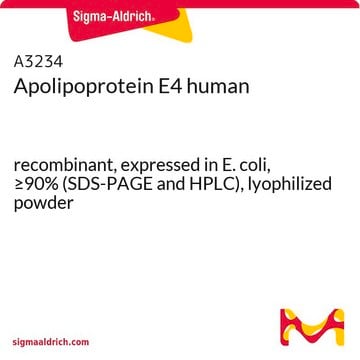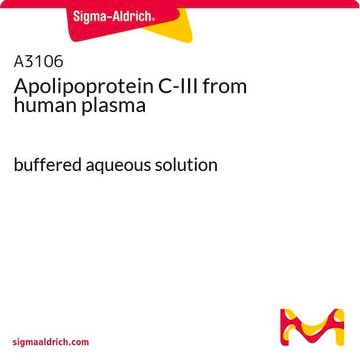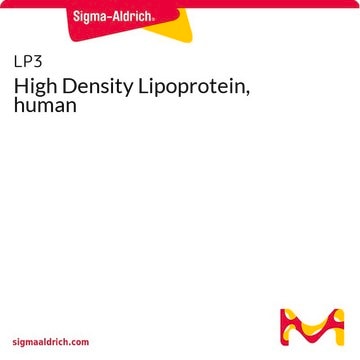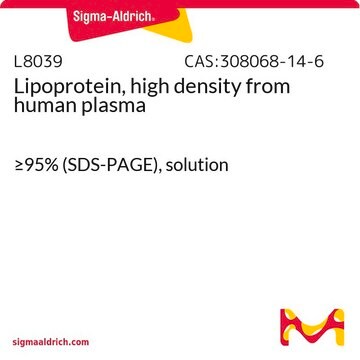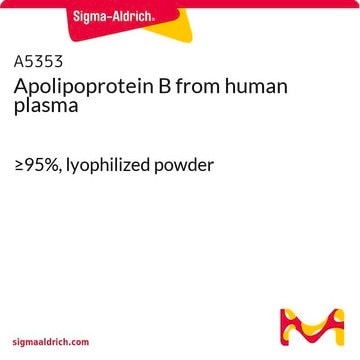178468
Apolipoprotein E, Human Plasma, Very Low-Density Lipoprotein
Native apolipoprotein E from human plasma. A major component of VLDL and IDL. Serves as a major cholesterol carrier. Essential for the normal catabolism of triglyceride-rich lipoprotein constituents.
Sinónimos:
Apo E
Iniciar sesiónpara Ver la Fijación de precios por contrato y de la organización
About This Item
UNSPSC Code:
12352202
NACRES:
NA.25
Productos recomendados
Quality Level
assay
≥95% (SDS-PAGE)
form
liquid
manufacturer/tradename
Calbiochem®
storage condition
OK to freeze
avoid repeated freeze/thaw cycles
shipped in
wet ice
storage temp.
−20°C
General description
Native apolipoprotein E from human plasma. A component of VLDL and a subclass of HDL. Serves as a ligand for LDL receptors, where it participates in the transport and redistribution of cholesterol and other lipids. Also functions in immunoregulation, cell growth, and differentiation. Present in normal plasma at concentrations of 50 µg/ml.
Native apolipoprotein E from human plasma. A component of VLDL and of a subclass of HDL. Present in normal plasma at concentrations of 50 µg/ml. Serves as a ligand for LDL receptors, where it participates in the transport and redistribution of cholesterol and other lipids. Also functions in immunoregulation and cell growth differentiation. Inhibits mitogen-induced T-lymphocyte proliferation and modulation of smooth muscle cell differentiation.
Packaging
Please refer to vial label for lot-specific concentration.
Warning
Toxicity: Standard Handling (A)
Physical form
In 50 mM NH₄HCO₃, pH 8.0.
Preparation Note
Prepared from plasma that has been shown by certified tests to be negative for HBsAg and for antibodies to HIV and HCV.
Reconstitution
Following initial thaw, aliquot and freeze (-20°C).
Other Notes
Kelly, M.E., et al. 1994. Cell Immunol. 159, 124.
Mahley, R.W. 1988. Science 240, 622.
Rall, S.C., et al. 1986. Methods Enzymol. 128, 273.
Mahley, R.W. 1988. Science 240, 622.
Rall, S.C., et al. 1986. Methods Enzymol. 128, 273.
Legal Information
CALBIOCHEM is a registered trademark of Merck KGaA, Darmstadt, Germany
Disclaimer
RESEARCH USE ONLY. This product is regulated in France when intended to be used for scientific purposes, including for import and export activities (Article L 1211-1 paragraph 2 of the Public Health Code). The purchaser (i.e. enduser) is required to obtain an import authorization from the France Ministry of Research referred in the Article L1245-5-1 II. of Public Health Code. By ordering this product, you are confirming that you have obtained the proper import authorization.
Storage Class
11 - Combustible Solids
wgk_germany
WGK 1
flash_point_f
Not applicable
flash_point_c
Not applicable
Certificados de análisis (COA)
Busque Certificados de análisis (COA) introduciendo el número de lote del producto. Los números de lote se encuentran en la etiqueta del producto después de las palabras «Lot» o «Batch»
¿Ya tiene este producto?
Encuentre la documentación para los productos que ha comprado recientemente en la Biblioteca de documentos.
Joanna L Richens et al.
International journal of molecular epidemiology and genetics, 5(2), 53-70 (2014-06-25)
Previous mass spectrometry analysis of cerebrospinal fluid (CSF) has allowed the identification of a panel of molecular markers that are associated with Alzheimer's disease (AD). The panel comprises Amyloid beta, Apolipoprotein E, Fibrinogen alpha chain precursor, Keratin type I cytoskeletal
Jian-Ying Zhou et al.
Journal of proteome research, 9(10), 5133-5141 (2010-08-12)
The discovery of biomarkers for neurodegenerative diseases will have a major impact on the efficiency of therapeutic clinical trials and may be important for understanding basic pathogenic mechanisms. We have approached the discovery of protein biomarkers for amyotrophic lateral sclerosis
Andrzej S Pitek et al.
PloS one, 7(7), e40685-e40685 (2012-07-26)
It is now well established that the surface of nanoparticles (NPs) in a biological environment is immediately modified by the adsorption of biomolecules with the formation of a protein corona and it is also accepted that the protein corona, rather
Nuestro equipo de científicos tiene experiencia en todas las áreas de investigación: Ciencias de la vida, Ciencia de los materiales, Síntesis química, Cromatografía, Analítica y muchas otras.
Póngase en contacto con el Servicio técnico
